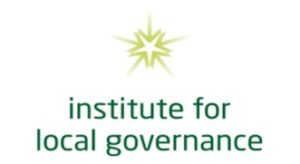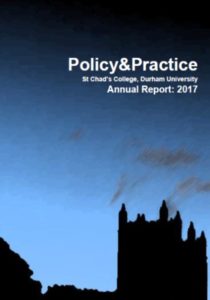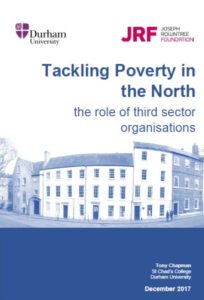IPPR North published a report today on the contribution business makes to the local third sector based on the longstanding Third Sector Trends study. The report, written by Professor Tony Chapman (St Chad’s College, Durham University) and Jack Hunter (IPPR North), shows that:
- Businesses in the North of England make a “significant contribution” of £1.9bn to charities and other voluntary organisations.
- Nearly 70% of third sector organisations in the North receive some form of financial support from business.
- But the voluntary sector prefers businesses’ cash over their in-kind support.
IPPR North’s Jack Hunter said:
“Business in the North make a significant and valued contribution to the third sector, but businesses need to get much smarter in how they support charitable activity. One-off volunteering events might be easy to arrange and encourage teambuilding, but they tend to have limited value on the ground – instead charities get the most benefit from a long-term and sustained relationship with businesses.”
And as Tony Chapman said:
“Many charity and business leaders may be surprised by the volume of financial and in-kind support given on social issues such as poverty. If the contribution of business remains largely invisible, then less of it will happen than could be the case. This research opens the door for more debate on where business can make a difference at the local level.”
The report can be downloaded at this address: https://www.ippr.org/publication/third-sector-and-business

 set transfer programmes. While some community businesses are large, employing many staff, the majority are quite small.
set transfer programmes. While some community businesses are large, employing many staff, the majority are quite small.
 people an opportunity to debate their value and potential impact.
people an opportunity to debate their value and potential impact.
 As an attraction, The Auckland Project will comprise Auckland Castle, for centuries the private palace of the Prince Bishops of Durham, along with galleries, gardens, restaurants, a park, a hotel and England’s first museum exploring the history of faith in the British Isles.
As an attraction, The Auckland Project will comprise Auckland Castle, for centuries the private palace of the Prince Bishops of Durham, along with galleries, gardens, restaurants, a park, a hotel and England’s first museum exploring the history of faith in the British Isles. ol of Commerce, Waseda University, Japan. He is Founder and President of an academy: Japan Forum of Business and Society, which is the first academic society in this field in Japan. He is an editorial member of several journals. He serves on the program committee of the International Conference on Corporate Social Responsibility at Humboldt University.
ol of Commerce, Waseda University, Japan. He is Founder and President of an academy: Japan Forum of Business and Society, which is the first academic society in this field in Japan. He is an editorial member of several journals. He serves on the program committee of the International Conference on Corporate Social Responsibility at Humboldt University. Rowntree Foundation and Garfield Weston / IPPR North.
Rowntree Foundation and Garfield Weston / IPPR North. In January 2018, Professor Kanji Tanimoto from Waseda University, Tokyo, will come to Durham on a two week research visit to St Chad’s College as a Visiting Professorial Fellow. In addition to the delivery of a seminar on 18th January in St Chads, he will meet colleagues from Durham University Business School, Newcastle University Business School and Newcastle Business School (Northumbria University). Meetings have also been arranged with the Institute for Advanced Studies, Teikyo University and the North East Initiative on Business Ethics (NIBE).
In January 2018, Professor Kanji Tanimoto from Waseda University, Tokyo, will come to Durham on a two week research visit to St Chad’s College as a Visiting Professorial Fellow. In addition to the delivery of a seminar on 18th January in St Chads, he will meet colleagues from Durham University Business School, Newcastle University Business School and Newcastle Business School (Northumbria University). Meetings have also been arranged with the Institute for Advanced Studies, Teikyo University and the North East Initiative on Business Ethics (NIBE). survey of 3,500 charities across the North East, North West and Yorkshire and Humber to capture their contribution in the region.
survey of 3,500 charities across the North East, North West and Yorkshire and Humber to capture their contribution in the region.